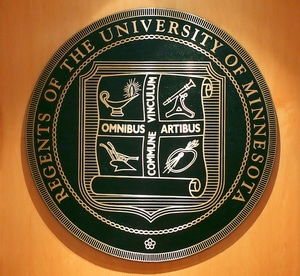Next week, the University of Minnesota Board of Regents Finance and Operations Committee will review the University’s recommended fiscal 2026 operating budget.
The proposed budget focuses on strategic investments in mission-critical areas while actively managing financial challenges facing the University, such as significant federal research funding cuts and uncertain state funding that is likely to result in a 3.5% decrease when adjusted for inflation. The recommended and balanced operating budget anticipates approximately $5.1 billion in revenue for the coming year to cover approximately $5.1 billion in expenses.
“The University of Minnesota is not immune to the unprecedented challenges facing higher education. We are making tough, strategic decisions to protect our mission and secure our future,” said President Rebecca Cunningham. “Our best response is to come together in support of the University of Minnesota’s mission with a focus on financial sustainability and strategic investment. Maintaining the status quo is not an option. Our response to this historic time will be multifaceted as we remain diligent in efforts to limit expenses and thoughtful in formulating new strategies that prioritize our core mission, and assess our assets to best position our university for success for generations to come.”
The proposal prioritizes maintaining and enhancing key services and programs to better serve students and to build strong relationships with the University’s constituency across Minnesota via the upcoming systemwide strategic plan. Workforce reinvestment initiatives include a proposed 3% merit increase for eligible employees and a 1% market adjustment pool, each applied at the discretion of the unit. While the proposed budget includes investments to ensure the University workforce is paid at market rate, it also anticipates a smaller workforce over the next two years.
All academic units within the University are being challenged to reshape their future by refining and focusing their priorities, and by targeting support unit functions with efficiency gains and service improvements to better support the mission. The proposed budget includes a 7% programmatic scope reduction to align spending priorities with projected revenues.
To sustain academic quality and student services, the proposed budget also includes tuition rate increases higher than those seen in recent years. Undergraduate resident and nonresident rates would increase by 4% on the Crookston and Duluth campuses, and by 5% on the Morris campus. The undergraduate resident rate on the Rochester and Twin Cities campuses would see an increase of 6.5%, with Twin Cities undergraduate nonresident rates increasing by 7.5%. General graduate rates increases would be 6.5% and 7.5% for residents and nonresidents, respectively.
The University remains committed to providing accessible, affordable education. Even with tuition increases, the actual cost of a degree for low- and middle-income students after financial aid is lower at the University of Minnesota than at any other four-year college in Minnesota. The University’s own investments in student financial aid complement state programs and are particularly important for those in the $80,000-$120,000 family income range, just beyond the state’s North Star Promise program threshold.
Gregg Goldman, executive vice president for finance and operations, will provide additional details as part of the recommended budget presentation on June 12.
“If approved by the Board of Regents, this budget moves us in the right direction. But it doesn’t eliminate risk,” said Goldman. “Our challenges are real, and the decisions we make now must position the University for long-term strength. I am grateful to our leaders across our campuses, colleges and units who have already modeled budget reductions and have been active and supportive partners in what we have been facing.”
The Board is expected to act on the budget proposal at a meeting on Wednesday, June 18.
Public forum on the recommended budget
The Board will accept in-person public comments on the budget proposal during the annual public forum scheduled to begin at 4:15 p.m. on Thursday, June 12. Speakers can sign up for a timeslot beginning at 3:45 p.m. in the lobby on the sixth floor, McNamara Alumni Center. Available speaking slots of three minutes each will be assigned on a first-come, first-served basis.
Feedback may also be submitted online at any time using the Board’s Virtual Forum. Comments received by 10:00 a.m. on June 17 and that meet the Board’s guidelines will become part of the public record included in the June 18 Special Meeting docket materials.
Also in June, the Board is expected to:
- Adopt its 2025-26 meeting schedule.
- Receive an update on University health sciences across the state with a focus on St. Cloud.
- Review student support services with Heidi Anderson-Isaacson, associate vice chancellor for student life on the Rochester campus, and Maggie Towle, senior associate vice president for student affairs on the Twin Cities campus.
- Review the University’s recommended fiscal 2026 capital improvement and operating budgets.
- Review the Morris Campus Plan with Chancellor Janet Schrunk Ericksen; Monique MacKenzie, planning director for Planning, Space and Real Estate; and Shane Stennes, chief sustainability officer.
- Receive an update on Crookston and Rochester enrollment in a review of strategic enrollment planning across the University’s campuses.
- Act on amendments to Board of Regents Policies: Academic Misconduct and Conflict Resolution Process for Employees.
- Receive annual reports from governance leaders representing students, faculty and staff.
- Recognize Rachel Croson, outgoing executive vice president and provost, and Kathy Schmidlkofer, outgoing president and CEO of the University of Minnesota Foundation.
In-person meeting attendees at the McNamara Alumni Center are required to go through security screening. All visitors are encouraged to allow ample time for the screening process. A livestream of the meeting and recordings of previous meetings are available at youtube.com/UMNRegents.
The Board’s Virtual Forum accepts audio, video and written input, which is shared directly with Regents and included in the Board’s public materials. The public is encouraged to visit the Virtual Forum to submit their comments. re




